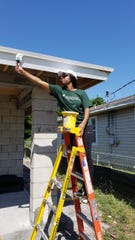Friday, January 31, 2020
Catie Wegman, Treasure Coast NewspapersPublished 6:00 a.m. ET Jan. 31, 2020 | Updated 1:17 p.m. ET Jan. 31, 2020
Habitat for Humanity will build 18 homes on Southeast Pettway Street in Hobe Sound over the next few years as part of Martin County's Gomez Affordable Housing Project.
The three- to four-bedroom homes, which will cost between $140,000 and $160,000, will be built on a two-acre treed lot between Dixie Highway and U.S. 1 — about 5 miles from Jupiter Island, reportedly one of the wealthiest zip codes in the nation.

Eighteen affordable homes will be built on Pettway Street between Dixie Highway and U.S. 1 in Hobe Sound. (Photo: Martin County CRA)
Habitat hopes to build six houses a year, starting in a year and completing the project in three to five years, said Mike Readling, Habitat for Humanity of Martin County's director of development.
Though Habitat funds all construction, the county is responsible for infrastructure such as updating roads and installing sewer lines, whose costs are not yet known, said James Clasby, the county's Community Redevelopment Agency project manager.
Some residents on Southeast 10th Street are losing their homes, and without affordable housing options in Martin County, they might not have anywhere to go. HANNAH SCHWAB/TCPALM
Affordable housing needs
Some area residents raised concerns about the project at a town hall County Commissioner Harold Jenkins hosted in December, including the need for it.
“What we hear more than anything is why do we need affordable housing?" Readling told TCPalm. "To put it simply, we receive 400 to 500 applications (from Martin County) every year for people seeking affordable housing. The need is definitely there.”
Lower-income residents are leaving the county because they can't afford to live there, Readling said. In 2019, the average apartment rental was $1,563 — up 13% from 2018, he said. There was no comparative data readily available for home values.
The latest census data shows a nearly 10% estimated increase in the county's population (2010-18), with a median annual income of $58,000, a median home value of $255,000, and nearly 11% of residents living poverty.
People shouldn't spend more than a third of their annual income on housing, so anyone below the $58,000 median income is spending too much on rentals and mortgages, Readling said.

CDL's Anna Knox paints fascia boards during a Habitat for Humanity of Martin County home build in April. (Photo: Corinne Rubal/Special to TCPalm)
Density, sewer lines
Doug Bernhard, who lives less than a mile from the project and has owned property in Hobe Sound since the 1980s, said he's not opposed to affordable housing, but doesn't think the county's population is decreasing due to a lack of it.
“It’s not pushing people out. It’s pushing certain people of an economic strata out and bringing others in," he said, adding he thinks affluent residents promote a healthier economy.
Some area residents also complained about density, but the county allows 15 units per acre, which is 12 fewer homes than Habitat will build.
“Eight or 10 homes isn’t going to change the complexion of the neighborhood, in my opinion,” Bernhard said. “I’m worried about densification. If we allow these high-density residential areas to perpetuate itself, we’re going to be caught in a jam where we don’t have enough road space."
Some residents also said it was unfair they'll eventually have to pay about $10,000 to convert from septic to sewer systems while the county installs lines for the Habitat homes — possibly using their taxpayer money.
South Martin Regional Utilities does not know how much sewer installation will cost residents or the exact source of funding for the Habitat project, said SMRU Director Monica Shaner. The utility is working with Martin County to get grants and use other government resources to make sewer conversions as inexpensive as possible.
It's much less expensive to install sewer lines while a new development is under construction versus after the fact, Shaner added.
“It just seems an arbitrary decision to decide winners and losers,” Bernhard said, adding the county is "picking and choosing" whom to subsidize.
The County Commission approved the Habitat project Dec. 17, but it's been in the works since 2015.




